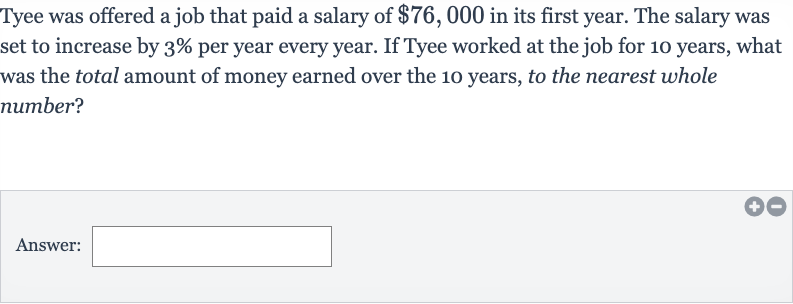AI tutor
Welcome to Bytelearn!
Let’s check out your problem:

Tyee was offered a job that paid a salary of in its first year. The salary was set to increase by per year every year. If Tyee worked at the job for years, what was the total amount of money earned over the years, to the nearest whole number?Answer:
Full solution
Q. Tyee was offered a job that paid a salary of in its first year. The salary was set to increase by per year every year. If Tyee worked at the job for years, what was the total amount of money earned over the years, to the nearest whole number?Answer:
- Identify Salary and Rate: Identify the initial salary and the annual increase rate.Tyee's initial salary is , and it increases by each year.
- Calculate Yearly Salaries: Calculate the salary for each year using the formula for compound interest, which is applicable here since the salary increases by a fixed percentage each year.The formula for the salary in the year is:where is the annual increase rate ( or ) and is the year number.
- Calculate Total Over Years: Calculate the total salary over years by summing up the salaries for each year.Let's denote the total salary by .We will calculate each year's salary and add them up.
- Calculate Yearly Salaries: Calculate the salary for each year and keep a running total.Year : Year : Year : Year : Year : Year : Year : Year : Year : Year : Now, add all the yearly salaries to get the total:
- Find Total Salary: Perform the addition to find the total salary over years.
- Round Total Salary: Round the total salary to the nearest whole number as requested.
More problems from Exponential growth and decay: word problems
QuestionGet tutor help
QuestionGet tutor help
QuestionGet tutor help
QuestionGet tutor help
QuestionGet tutor help
QuestionGet tutor help
QuestionGet tutor help
QuestionGet tutor help
QuestionGet tutor help
